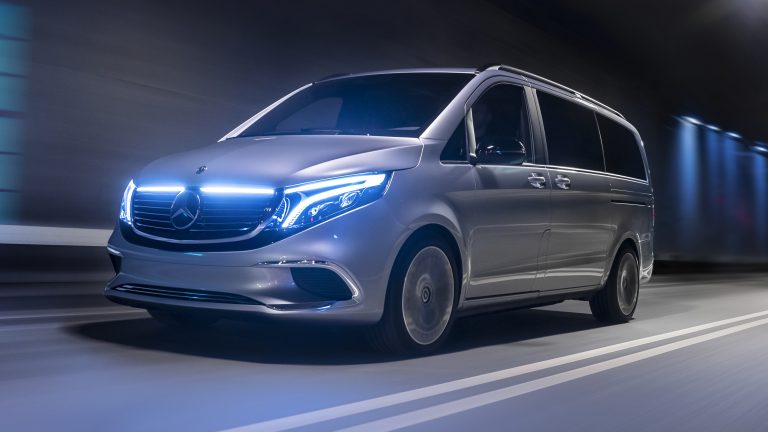Mercedes-Benz has introduced its all-electric EQV to the South African market, marking a significant step in blending luxury with sustainable mobility. Positioned as the electrified counterpart to the esteemed V-Class, this premium multi-purpose vehicle (MPV) accommodates up to seven passengers while delivering cutting-edge technology and refinement. Priced from R2,301,577, the EQV targets affluent families and executive shuttle services, cementing its place at the upper echelon of people carriers, as confirmed by pricing data from Duoporta.
The EQV is powered by a front-mounted electric motor, producing 174kW and 500Nm of torque, enabling a top speed of 158km/h and a 0-100km/h sprint in 12.1 seconds—impressive for a vehicle with a 2,748kg kerb weight. Its 90kWh battery offers a claimed range of 363km, aligning with urban and intercity demands in South Africa’s diverse driving conditions. Charging flexibility enhances its appeal: a full charge via an 11kW AC cable takes approximately nine and a half hours, while a 110kW DC fast charger can replenish 80% capacity in just 40 minutes. Dimensionally, the EQV measures 5,140mm in length, 2,244mm in width (including mirrors), and 1,901mm in height, with a 3,200mm wheelbase ensuring ample cabin space. The inclusion of AIRMATIC air suspension further elevates ride comfort, smoothing out the country’s often uneven road surfaces, according to Mercedes-Benz South Africa’s press release.
Inside, the EQV exudes sophistication, boasting a dual 12.3-inch MBUX interface that integrates a digital instrument cluster and infotainment system. The touchscreen supports Apple CarPlay, Android Auto, and augmented reality navigation, which overlays real-time traffic and route data onto the road ahead, enhancing driver confidence in busy cities like Johannesburg and Cape Town. The cabin is adorned with premium features, including a Nappa leather steering wheel, 64-colour ambient lighting, a 15-speaker Burmester audio system, a wireless charging pad, a panoramic sunroof, dual-zone climate control, and heated and ventilated electric front seats. All seven seats are upholstered in leather, ensuring passenger comfort across long journeys, as detailed in Car Magazine.
Safety remains a cornerstone, with the EQV equipped with nine airbags, adaptive cruise control, front and rear parking sensors, a 360-degree camera, active brake assist, tyre pressure monitoring, lane-keep assist, driver attention alert, traffic sign recognition, and blind-spot monitoring. These features align with South Africa’s growing demand for advanced driver assistance systems, particularly in premium vehicles, where road safety concerns are paramount due to a 7% rise in urban traffic incidents reported in 2024, per Arrive Alive. Each EQV includes a five-year/100,000km warranty, with optional maintenance plans available to suit fleet operators and private buyers, offering flexibility in a market where 60% of luxury vehicle owners opt for extended service contracts, according to BusinessTech.
The EQV’s launch taps into South Africa’s accelerating shift towards electric vehicles (EVs), with EV sales climbing 78% year-on-year in 2024, driven by luxury brands like Mercedes-Benz and BMW, as noted by AutoTrader. The country’s EV market, though nascent at 2% of total vehicle sales, is bolstered by expanding charging infrastructure, with over 400 public stations installed by mid-2025, predominantly in Gauteng and the Western Cape, per MyBroadband. Mercedes-Benz’s strategy aligns with this trend, as the EQV joins its electrified portfolio alongside the EQS and EQE, targeting a 20% EV sales share by 2027. The EQV’s premium positioning competes directly with the likes of the BMW i7 and the forthcoming electric Toyota Quantum, though its seven-seat configuration and 363km range offer a unique edge in the MPV segment, where diesel models still dominate 85% of sales, per Wheels24.
Beyond its technical prowess, the EQV caters to South Africa’s luxury shuttle market, serving high-end tourism and corporate transfers, sectors that contribute R15 billion annually to the economy. Its spacious interior and advanced connectivity make it ideal for airport transfers and safari lodge services, particularly in regions like Kruger National Park, where eco-conscious travel is gaining traction. However, challenges persist, including high import duties on EVs, which inflate prices by up to 25%, and limited rural charging infrastructure, which could cap range confidence for long-distance buyers, as highlighted in Bloomberg. Mercedes-Benz is countering this through partnerships with GridCars, aiming to add 100 new chargers by 2026, and offering home charging solutions bundled with EQV purchases.
The EQV’s debut underscores Mercedes-Benz’s commitment to electrification while maintaining its hallmark luxury. As South Africa’s EV adoption accelerates, driven by a 30% rise in consumer interest in sustainable transport options, the EQV is poised to redefine premium family mobility, blending practicality with environmental responsibility in a market ripe for transformation.


